We’re relatively certain it’s for real this time. It’s come back twice before, as direct-to-video movies and then two seasons on Comedy Central, but after its series finale this past Wednesday it appears as if we’ve finally seen the last of Fry, Leela, Bender, and the Planet Express crew of Futurama.
Funny thing, though, I didn’t actually like Futurama when it first premiered on Fox in 1999. Bender was not the new Homer Simpson, despite what the advertising promised. Plus, even being a lifelong sci-fi geek I failed to find a future overrun with oafish, alcohol-fueled robots particularly funny, and the running joke about modern day public figures having survived into the future as sentient-but-severed heads living in formaldehyde jars seemed plain weird. It was not until the re-runs made their way to Adult Swim that I converted, enticed by the show’s ability to wield pathos with the precision of a skilled surgeon. Plus, I finally understood many of the show’s pop culture references, like an entire episode being a parody of 2001: A Space Odyssey. Even if the new Comedy Central episodes weren’t as uniformly strong as the show’s final seasons on Fox, I still looked forward to every episode, and in truth enjoyed the new episodes of Futurama more than the current new episodes of show co-creator Matt Groening’s other long-in-the-tooth animated classic The Simpsons.
So, in celebration of the producing/writing of Matt Groening, David X. Cohen, Dan Vebber, Ken Keeler, Eric Kaplan, Eric Horsted, animation of a small army of supremely talented artists, and brilliant voice acting of Billy West (Fry, The Professor, Dr. Zoidberg), Katey Segal (Leela), John DiMaggio (Bender), Lauren Tom (Amy), Phil Lamarr (Hermes), and Maurice LaMarche (so many characters that I’ve lost count) here are 15 amazing episodes of Futurama (season and episodes #’s are according to broadcast order):
(SPOILERS AHEAD, FUN A-HOY)
15) “Insane in the Mainframe” (Season 3, Episode 12)
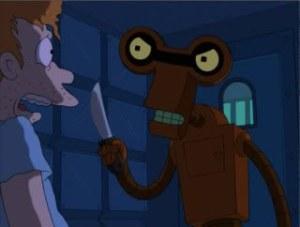
What It’s About: Fry and Bender are admitted to an insane asylum for robots after being charged for their unwitting roles in a bank hold-up, Fry only being assigned there because the human insane asylums are full. As a result of the mental conditioning program in the asylum, Fry becomes convinced he is actually a robot.
Why It’s Awesome: In classic Matt Groening show fashion, before we get to the heart of the episode, a fun One Flew Over the Cuckoo’s Nest parody with a literal deprogramming of Fry, we’ve had jokes about Zoidberg being poor and Fry having no real money to invest in anything. Plus, we’ve been introduced to a fantastic new recurring character, the insane knife-wielding robot Roberto (“I’m not crazy; I’m just not user-friendly”), and enjoyed the returns of the recurring Judge Whitey (“I’m told by my caddy that a bank is where people keep money that is not properly invested”) and Hyper-Chicken lawyer (“Now I may just be a simple country Hyper-Chicken, but I know when we’re finger-licked”). The element that puts this episode over the top, though, is the brilliant vocal performance of David Herman as Roberto, managing to walk the line between funny and genuinely threatening, like the way Roberto insists “It was NOT nothing!” when Bender assures him it was no big deal helping him break out of the insane asylum.
14) “Parasites Lost” (Season 3, Episode 4)
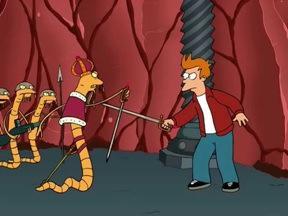
What It’s About.: After eating a bad sandwich at an interstellar truckstop, Fry becomes infected with parasitic worms which actually improve his I.Q. and physical acumen, enabling him to give his best yet effort at wooing Leela. When Fry becomes aware of what is happening, he has to do away with the worms so that he can know for sure if Leela can love the real him and not just the parasite-enhanced version.
Why It’s Awesome: You could do an entire list simply comprised of your favorite Fry/Leela episodes. In truth, that might be a well the show went to a little too often. However, Fry was such an utter innocent – a classic sweet-but-stupid character – that his devotion and affection for Leela or Bender or his long-since dead brother or dog accounted for the show’s most effective emotional moments. He was always so completely pure and charming. ”Parasites Lost” has a familiar Flowers for Algernon storyline married with an obligatory Fantastic Voyager homage in which miniature robotic versions of the crew are created and sent into Fry’s body to fight off the parasites. By the end, when Fry is free of the parasites and unable to replicate his prior brilliance with the holophonor (a combination obo & holographic projection musical instrument) he still attempts to play, creating a crude holographic image of Leela to accompany his discordant tune. It’s just so adorable.
13) “Amazon Women in the Mood” (Season 3, Episode 5)
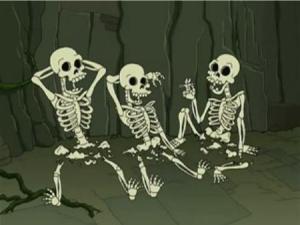
What It’s About.: After a double date goes awry, Leela, Amy, Zap Brannigan and Kif end up stranded on a planet occupied by giant, amazon women. Fry and Bender arrive to save them, but their and Zap Brannigan’s chauvinistic jokes anger the amazon women which gets all of them into deep snu-snu.
Why It’s Awesome: Of the 140 Futurama episodes (124 if you don’t include the direct-to-DVD movies), only 5 or so were written by a woman. So, what, then, are we to make of “Amazon Women in the Mood,” an episode that strings along a series of sexist jokes from stupid male characters who are immediately punished after each of their jokes? Personally, I find it hilarious. I particularly enjoy the amazon women’s defense of women’s basketball, “They no dunk, but good fundamentals”. However, I have watched this episode with a girl who did not laugh a single time the entire time. So, the humor may not work for everyone. The element of a planet of females using enslaved males for species perpetuation is a common sci-fi trope given a hilarious treatment here, such as a moment in which Fry and Zap Brannigan alternate between stupid grins and looks of horror when they discover that when the gigant women say they want to have snu-snu with them they actually mean sex. Bea Arthur’s vocal performance as the fembot in charge of the amazons is a particular delight.
12) “The Cyber House Rules” (Season 3, Episode 11)
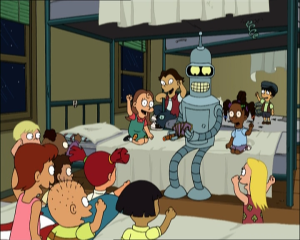
What It’s About.: Leela has an operation to give her two eyes instead of one thus making her appear normal, much to Fry’s protest. She begins dating her doctor, again, much to Fry’s protest. Meanwhile, Bender adopts the children from the orphanage Leela grew up at as part of an ill-fated get-rich-quick scheme in which he collects the weekly government stipends allotted to him for each child he adopts.
Why It’s Awesome: This is a classic ”be yourself” episode of Futurama in which Leela’s attempt at conformity reveals that beauty truly is in the eyes (or eye, in this case) of the beholder. The B-plot involving Bender in a hilarious money-making scheme results in some delightful “un-caring, mean old guy with adorable little kids” moments. By the end, when Bender has come to genuinely love the kids it is as predictable as it is earned and incredibly touching, Bender protesting, “I hate you all!” as the kids joyfully hug him thus deflating the sentimentality even though we know Bender doth protest too much.
11) “Godfellas” (Season 4, Episode 8)
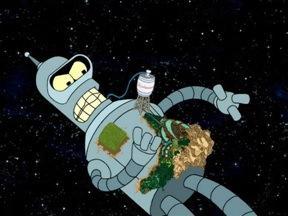
What It’s About.: During a battle with space pirates, Bender is accidentally jettisoned out of a torpedo tube of the Planet Express ship. Adrift in space and moving faster than the ship can catch up with, a civilization of tiny humans grows on Bender’s chest (and shiny metal backside) after he is struck by an asteroid. The humans worship him as God, but eventually splinter into two warring factions, atheists vs. Bender worshipers. Shortly thereafter, Bender encounters a cosmic entity which may or may not be God. Meanwhile, Fry desperately tries to figure out a way to find and rescue Bender.
Why It’s Awesome: Unlike The Simpsons, Futurama did not address religion with great frequency. Perhaps that’s because “Godfellas” set the bar too high, presenting as concise and nuanced a discussion of religion and faith as you are likely to ever see from a half-hour animated comedy. They even won a Writers Guild of American award for this episode. Its A-plot is positively Twilight Zone-esque, with Bender becoming God to a tiny civilization, and its B-plot a reminder that Fry was just as devoted to his friendship with Bender as he was to his romance with Leela.
10) “Three Hundred Big Boys” (Season 5, Episode 11)
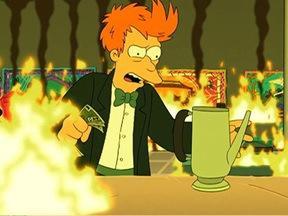
What It’s About.: President Nixon grants $300 tax rebates to each individual citizen, and multiple stories splinter off to reveal what each cast member does with the $300 before all of the storylines converge at an exhibit all of the characters have been invited to by Zap Brannigan.
Why It’s Awesome: This is Futurama‘s take on the classic The Simpsons episode “22 Short Films About Springfield” (the one where Lisa gets gum in her hair, Flanders stung by a bee, Apu closes the Kwik-E-Mart for an hour, etc.), a format designed to utilize a show’s deep roster of supporting characters. However, it actually improves upon “22 Short Films” structure by creating a better defined actual plot reason for all of the characters splintering off, and brilliantly brings them together in the end. Honestly, though, the main reason to watch this episode is Billy West’s inspired vocal performance as the increasingly caffeinated, almost Cornholio-esque (for you Beavis & Butthead fans) Fry, who uses his money to buy and drink 100 cups of coffee.
9) “The Day the Earth Stood Stupid” (Season 3, Episode 7)
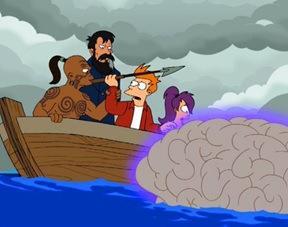
What It’s About.: Leela’s pet, Nibbler, reveals himself to actually be a sentient alien (with a totally boss, deep voice) engaged in a long-standing war with a race of giant, floating brains. While Leela accompanies Nibbler to his planet, the evil brains show up on Earth, reducing the I.Q.’s of everyone on the planet except for Fry because he “did the nasty in the pasty” (it’s complicated). .
Why It’s Awesome: There is something inherently hilarious to me about the concept of a supremely intelligent alien race (Nibbler and his race of nibblonians) looking positively adorable, mistaken for mere pets by most creatures on the planets they visit. For example, the entire time the nibblonians are explaining everything to Leela she consistently reacts with a mindless, “Oh, you’re so adorable!” This is a mythology-building episode which shakes things up about a part of the show we thought we already understood, i.e., Nibbler, yet even with all that it never misses to hit a comedic beat. Plus, any episode which features the following exchange is always going to get my vote:
Brain-Drained Leela: [After reaching into a fireplace to retrieve a piece of paper] Oww, fire hot!
Brain-Drained Professor: The professee will help. [Reaches into fireplace, pulls his hand back] Oww, fire indeed hot.
8) “Where No Fan Has Gone Before” (Season 4, Episode 12)
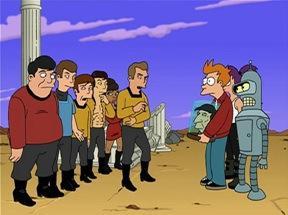
What It’s About: An energy being on a distant planet is the universe’s biggest Star Trek fan. Like any true Star Trek fan, he is into collecting memorabilia from the show, except in this case that memorabilia includes the preserved, still-functioning heads of all Original Series cast members (except James Doohan and Leonard Nimoy) which he can place onto new bodies. All he needs to complete the collection is Nimoy, who is brought to the planet by Fry, Bender, and Leela. Oops! Once there, all involved parties are forced to partake in the Star Trek convention from hell. All Original Series actors (again, except Doohan) guest star, voicing themselves.
Why It’s Awesome: This was bound to happen. Being a futuristic sci-fi show centered around a spaceship’s crew with a special focus on a central trio (Bender, Fry, Leela), Futurama was going to have address the Star Trek in the room. The way they did it, though, ranks up there with Galaxy Quest as the most loving and hilarious tribute to Star Trek. Not surprisingly, the Futurama writers really know their Star Trek, with so many visual gags and lines of dialog both tearing Star Trek down while paying homage. Granted, the treatment of the universe’s greatest Star Trek fan being a loser who needs to move out his mother’s basement is perhaps a bit too obvious, but that stereotype exists for a reason.
7) “Love and Rocket” (Season 4, Episode 4)
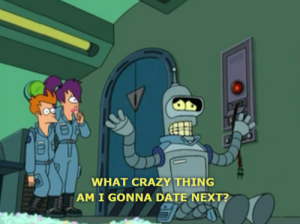
What It’s About.: Futurma combines Fatal Attraction with 2001: A Space Odyssey when Bender begins dating the Planet Express ship, voiced for the first and only time by Sigourney Weaver.
Why It’s Awesome: Over the course of the show, Bender was shown to have multiple girlfriends, most of them robots (and Lucy Liu). It was a by-product of the show’s treating robot characters as if they were human. However, it always begged questions about how exactly Bender and his conquests actually displayed affection for one another physically. No episode presents this question more than “Love and Rocket,” and while it’s never completely clear what it really means that Bender is dating a spaceship the episode really shines after the two break up. Sigourney Weaver delivers an inspired performance as a manic, jilted lover version of HAL-9000. The references to 2001: A Space Odyssey throughout the episode are numerous, such as Bender’s singing of the song “Daisy” pre-breakup. My favorite homage moments comes when we think the ship (as HAL does in 2001) is reading the lips of Fry, Bender, and Leela as they talk about her in secret only to have the ship lament, “Oh, how I wish I could read lips.”
6) “The Devil’s Hands Are Idle Playthings” (Season 5, Episode 16)
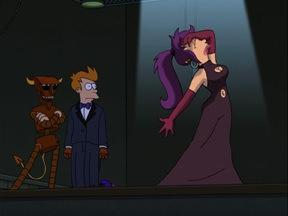
What It’s About.: The show’s original series finale to its time on Fox in which Fry makes a bargain with the robot devil to switch hands so that he might master a musical instrument (the holophonor) and compose an opera dedicated to Leela. The second half of the episode is almost entirely sung-through.
Why It’s Awesome: Had this been the end to Futurama, that would have been okay. Half of it is a musical episode, Dan Castellaneta (Homer Simpson) delivers a brilliant turn as the robot devil, and the incredibly clever concept of the holophonor is utilized to maximum benefit. More importantly, it re-iterates the lesson of prior Fry/Leela episodes: that it is your willingness to do anything for the person you love that is important, not your actual ability to do so. What Fry can create without any assistance is an image of himself and Leela kissing one another and walking off into the distance together, and Leela’s reaction from the audiences indicates that might finally be enough. They manage such potential schmaltz with a healthy side-helping of biting humor, such as Zoidberg encouraging Fry to re-start the opera after he’s lost his robot hands only to turn him on seconds later when the new music sounds awful (Zoidberg: “Your music’s bad, and you should feel bad!”).
5) “The Late Philip J. Fry” (Season 6, Episode 7)
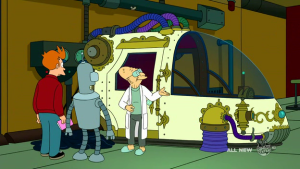
What It’s About.: Another one of Futurama’s signature time-travel episodes that balances its wibbly-wobbly time travel with a heartfelt examination of Fry and Leela’s relationship. We watch Fry, Bender, and The Professor stuck accidentally traveling inexorably forward in time in a time machine while cutting back to see what became of Leela and remaining Planet Express crew.
Why It’s Awesome: Just when you thought the Fry/Leela tap was dry, the Comedy Central era of the show gave us “The Late Philip J. Fry.” The time travel component of the episode provides for a lot of fun with time travel tropes, such as efforts to kill Hitler and arriving at increasingly bizarre futures that don’t quite please all involved parties if any. Plus, with Fry, Bender, and the Professor traveling through time there are plenty of treats for longtime fans as they see events from prior episodes flash right by them through their view screen. Holding it altogether is an incredibly touching emotional throughline of Fry’s regret for having unintentionally abandoned Leela and Leela’s increasingly bitter and sad life without. It’s nice that in the past it had been Fry attempting to leave a message expressing his love for an unseeing Leela (“Time Keeps on Slippin’”). This time Leela is an actual character with agency of her own as opposed to an object of affection for Fry, as it is she who leaves a message in an underground cave for Fry.
4) “The Why of Fry” (Season 5, Episode 8)
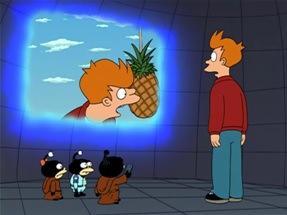
What It’s About.: A sequel to “The Day the Earth Stood Stupid” except instead of Leela discovering the truth about Nibbler this time it’s Fry. He laments the direction of his life only to discover that according to Nibbler he is the most important person in the universe. Fry again has to battle the giant, floating brains, but discovers that it is because of Nibbler that he was frozen in the cryogenic chamber in the show’s first ever episode.
Why It’s Awesome: Ever feel down and unimportant. Wouldn’t it be cool if your pet (technically, your co-worker’s pet) then suddenly opened its mouth and informed you that you were actually the most important person alive and took you on adventure? That’s Fry’s experience in “The Why of Fry,” which is a classic example of a show ret-conning its own origins (it was no accident that Fry was frozen) but managing to do so in an interesting way that informs rather than replaces what came before. In the B-plot, Leela’s date with the mayor’s aide is a perfect example of her continual run of bad boyfriends. I particular love the running jokes about just how astonishingly poor the kids from the orphanage are, especially a bit involving an adorable little girl questioning if they even have socks
3) “The Sting” (Season 5, Episode 9)
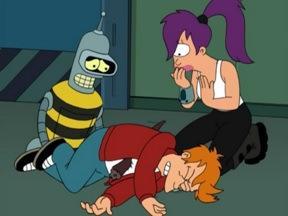
What It’s About.: The Professor sends the crew to a gigantic bee hive to collect honey, a mission which had claimed the lives of a prior Planet Express crew who worked for him. At the beehive, while defending Leela from an attacking bee Fry appears to be stabbed to death by the bee’s stinger. The episodes becomes progressively more surreal as Leela’s grieving process for Fry deepens.
Why It’s Awesome: The Fry/Leela episodes are legion, but almost always primarily told from the point of view of Fry. That’s partially what makes “The Sting” so captivating – we see it from Leela’s point of view, as she becomes increasingly grieve-stricken due to Fry’s apparent death. As the truth of the situation gradually reveals itself, the episode masterfully segues into surrealistic imagery and some of the most inventive animation yet accomplished by the show to that point.
2) “Roswell That Ends Well” (Season 4, Episode 1)
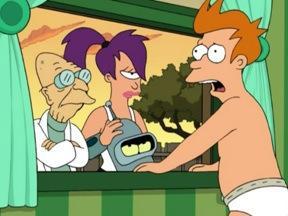
What It’s About.: After accidentally traveling back in time, the Professor, Leela, Bender, Fry, and Zoidberg end up in 1947 Roswell, New Mexico. Their presence turns out to be the source of the rumors of an alien space ship crash landing in Roswell, and Fry interferes with his own timeline when he encounters his own grandfather on the Roswell Army base.
Why It’s Awesome: You remember how effectively and (hopefully) funny it was in Back to the Future when Marty McFly went on a date with the teenage version of his own mother? Well, because it’s a cartoon and thus free to skirt the boundaries of reality Fry goes one further than Marty McFly in “Roswell That Ends Well” by sleeping with his own grandmother (he did not know who she was at the time) and thus becoming his own grandfather. The way Billy West plays Fry’s almost catatonic state after he realizes what he’s done is comedy gold, as is the episode’s entire second half in which the Professor drops his protests of not changing anything in the past for fear of altering the future and just full-on attacking the Roswell Army base. Plus, Zoidberg re-eating food as it’s removed from him while the Roswell doctors experiment upon him gets me every time.
1) “Jurassic Bark” (Season 5, Episode 2)

What It’s About.: The dang dead dog episode in which Fry discovers the fossilized remains of his pet dog Seymour, and the Professor discovers a method by which he could actually bring the dog back to life. Bender becomes annoyed with Fry’s mooning over his lost pet, and flashbacks reveal that Seymour was basically Hachi – a heart-breakingly faithful pet long since after his master has departed.
Why It’s Awesome: That ending. It just…oh, no. I’m getting all verklempt. I’m sorry. I have to go hug my dog (and no, that is not a euphemism, you sicko!).
Those Are Mine, Here Are Some Others:
- Top 10 Best Futurama Episodes (io9.com)
- Explore the Wild World of Futurama in Just 10 Episodes (avclub.com)
- Futurama’s Twenty Best Episodes So Far (electricfeast.com)
So, what do you think, guys? Are you a fan of our picks, or are there other episodes you think should have made the cut? Let us know in the comments!

